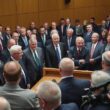The recent raids at a Frankfurt police precinct have triggered a demand for swift and thorough investigation into allegations of police brutality, raising uncomfortable parallels to a past scandal and sparking a political reckoning within Hesse. Irene Mihalic, Parliamentary Managing Director of the Green Party in the Bundestag, voiced her concern, emphasizing the urgency of uncovering the truth behind the accusations.
While acknowledging the cooperation of the Frankfurt police and the public prosecutor’s office in initiating the inquiry, Mihalic highlighted a particularly troubling aspect: the precinct’s history. It is the same institution previously embroiled in the “NSU 2.0” scandal, a series of threatening letters and actions targeting asylum homes and left-wing activists. The connection is alarming given the complex and controversial decisions surrounding that prior case, where some officers suspected of involvement faced dropped charges while others were convicted of related offenses.
The nature of the allegations currently under scrutiny – involving accusations of abuse of power, unlawful use of force and potential complicity amongst officers – threatens to further erode public trust. These are serious charges against an institution vested with the state’s monopoly on violence, requiring an unwavering commitment to the rule of law.
The situation has placed significant pressure on Hesse’s Interior Minister, Roman Poseck (CDU). Mihalic directly called on Poseck to ensure every officer under his jurisdiction adheres to the principles enshrined in the Basic Law and that their actions demonstrably serve and do not undermine, the Rechtsstaat – the German legal state. Failing to address these concerns and guaranteeing unwavering adherence to legal and constitutional standards risks a crisis of confidence in law enforcement and a profound questioning of the internal oversight mechanisms within the Hesse police force. The need for independent scrutiny and a full accounting of the precinct’s past and present practices is now more critical than ever.





